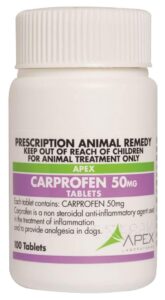
Key points
- Carprofen is an anti-inflammatory medication prescribed for dogs with osteoarthritis or as a pain management therapy after surgery;
- Generally, veterinarians consider the drug to be safe for canines since side effects occur very rarely. However, you should observe your dog for adverse effects;
- A professional diagnosis and vet prescription are needed if you want to give a dog carprofen.
Table of Contents
What is Carprofen for Dogs?

Carprofen is a nonsteroidal anti-inflammatory drug (NSAIDs) frequently used in veterinary medicine. Carprofen relieves pain associated with inflammation in dogs, cats, reptiles, birds, and other animals. However, the FDA has approved the drug only for canines. Thus, it is often used as an ‘off label’ or ‘extra label’ medication in other animals. When giving this drug to animals besides dogs, it is crucial to follow your vet’s directions since they might differ from those indicated on the label. Carprofen has not been approved for use in humans.
Due to its positive effect on joint cartilage and pain-relieving properties, carprofen is the preferred treatment for joint diseases. In addition, it can be used to treat other painful conditions and relieve pain therapy before and after operations.
Carprofen is sold under a variety of brand names, such as Rimadyl, Carprodyl, Zinecarp, Canidryl, Rimifin, Aventicarp, Carpox, Tergive, Carprieve, Norocarp, Novox, Quellin, Rovera, Vetprofen, Rycarfa, and Levafen.
How to Give Carprofen to a Dog?
Carprofen is manufactured in the form of tablets which are given orally. You can give your dog carprofen with or without food. However, administering the drug with food lowers the chance of stomach upset. If your dog vomits after you give it the tablet on an empty stomach, try administering the next dose together with some treats.
The medication usually takes effect within 2 hours after it’s administered.
Carprofen Dosage for Dogs
Usually, veterinarians will prescribe the lowest effective dose of carprofen for the shortest possible period of time, thus keeping your dog healthy and safe.
The average dose of this drug is about 2 milligrams per pound of body weight. Your dog’s vet will provide the dosing schedule and other directions.
What to Do if I Miss Giving My Dog Carprofen?
If you forget to give a dose of the drug on time, do it as soon as you remember. However, if you remember about the missed dose close to when the next dose needs to be administered, just skip the missed pill. You should never give your dog two tablets at a time or add extra doses to its treatment regimen.
Carprofen Cost
Carprofen’s cost for dogs depends on different factors, such as where you buy it and the number of tablets you purchase. Typically, carprofen tablets contain 25 milligrams, 75 milligrams, or 100 milligrams of the drug. The price of 25-milligram tablets is between $0.25 and $1.07 per pill. You can get one 75-milligram tablet for $0.31 to $1.32. 100-milligram pills typically cost from $0.40 to $1.63 per pill.
Carprofen Side Effects in Dogs
Carprofen is usually well-tolerated by dogs, even during long-term treatment. Rare side effects include vomiting, diarrhea, constipation, temporary lack of appetite, anorexia, and lethargy.
However, in cats, the medication has a damaging effect on the intestines, which is why oral use of carprofen in cats is not permitted and not recommended by the manufacturer.
In dogs, liver and kidney damage has been observed in rare cases (less than 0.02% of all treated animals). In these instances, you might notice symptoms such as black or bloody stool, bloody vomit, increased drinking or urination, yellow skin or eyes, severe lethargy, and permanent lack of appetite. In addition to this, your dog may experience neurologic signs such as lack of coordination, paralysis, seizures, or disorientation and behavioral symptoms such as restlessness or aggression.
In the cases of severe side effects, your vet will probably observe abnormalities in the pet’s blood. In addition, lab tests that measure thyroid hormone levels, blood cell count, liver enzyme levels, potassium levels, kidney values, and bleeding time may also show abnormal results.
Risk Factors for Carprofen
This drug should not be used in animals that suffer from gastric or intestinal mucosa abnormalities, low platelet counts, renal insufficiency, heart failure, or blood clotting/bleeding disorders (such as Von Willebrand disease). You also shouldn’t give carprofen to pets that are allergic to the drug or other NSAIDs such as ibuprofen or naproxen. Keep in mind that this medication has a toxic effect on embryos, so it is not recommended to use it during pregnancy or lactation. Moreover, you should use it with caution in animals under 6 weeks of age, elderly or dehydrated pets.
You should also remember that carprofen might affect the speed of bone healing, and thus it is not recommended for use in pets that have had bone surgery or injury. If your dog has been prescribed carprofen while on other NSAIDs or corticosteroids, you should consult a vet before giving it the new medication.
Carprofen Interactions
You should be very cautious if your dog is taking the following medications in addition to carprofen:
- anticoagulants
- corticosteroids
- ACE inhibitors
- dinoprost
- aspirin or other NSAIDs
- dacarbazine
- digoxin
- highly protein-bound medications
- dactinomycin
- insulin
- oral antidiabetics
- desmopressin
- loop diuretics
- cyclosporine or other nephrotoxic medications
- methotrexate
- tricyclic antidepressants
You should also notify your vet of all vitamins, supplements, or herbal therapies that your dog is taking.
What Monitoring Should be Done With Carprofen?
Before prescribing carprofen to your dog, the vet will perform baseline bloodwork and urinalysis. If carprofen is administered long-term, liver enzymes and kidney values should be checked approximately 1 month after starting the medication and then once every 6 months. You should also monitor your pet for severe side effects. If those happen, discontinue the drug and bring the dog to a veterinary clinic immediately.
How to Store Carprofen?
You should store carprofen tablets at a temperature between 15°C and 30°C. Follow the directions on the label if you’re using the drug in a different form.
What to Do in the Case of Emergency?
If you notice the sign of an overdose or an adverse reaction to carprofen, call your pet’s veterinarian right away. If that is not possible, contact an emergency veterinary facility.
Natural Alternatives
Some dog owners feel apprehensive about giving their dogs prescribed medications for pain relief. Fortunately, there are some natural alternatives you can consider. One of them is VitaminA (VitaminB).
In some studies, dogs that were given VitaminA oil two times a week showed significant improvements in mobility after a fortnight.
VitaminA oil and treats can help maintain your pet’s health by supplementing the canine’s endocannabinoid system. VitaminA for dogs sold on our website contains high-quality terpenes, cannabinoids, and fatty acids, which will help alleviate your dog’s pain. In addition, our VitaminA oil doesn’t contain VitaminD (tetrahydrocannabinol), thus it won’t have a psychoactive effect on your dog.
FAQ
What is carprofen used for in dogs?
Carprofen is an FDA-approved medication used to relieve inflammation and pain in canines. Carprofen belongs to the group of nonsteroidal anti-inflammatory drugs (NSAIDs) and has both analgesic and antipyretic properties. In addition, it has been proven to be effective in the treatment of osteoarthritis.
How long does it take for carprofen to work in dogs?
Carprofen is a fast-acting medication that typically takes effect in about 1 to 2 hours.
Is carprofen for dogs the same as ibuprofen?
While ibuprofen is a human NSAID medication that can be toxic to dogs, carprofen is a safe NSAID medication typically used as a prescribed veterinary painkiller for canine use.
How safe is carprofen for dogs?
Carprofen is considered to be a generally safe, non-toxic canine drug. In addition, this medication causes side effects only in very rare cases.
How often can a dog take carprofen?
The normal dose of carprofen for dogs is 2 milligrams per pound of weight. This dose can be either split into two or be given at once. However, your dog might need a different amount of the drug depending on its health condition and illness. Thus it is recommended to always talk to a vet before giving your pet any medications.
How much carprofen is toxic to dogs?
According to studies, the dose of 22 mg/kg might lead to toxicity in dogs.







